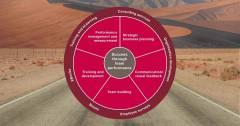There is no doubt that systems for rewarding performance can be a very powerful motivating tool to improve productivity, quality and overall teamwork.
Yet most reward systems are geared around a few individual managers rather than encouraging a philosophy of one team, one direction, and improvement of the overall system. As global competition intensifies, a real opportunity for competitive advantage exists through the encouragement and development of the capabilities of all employees in the service of the organization.
Organizations that establish a reward system for employees that are based on productivity goals will increase employee commitment because such schemes foster responsibility. Employees will want to own tasks that are recognized and appreciated by the organization.
Reward systems that are based on team efforts will encourage team members to work cooperatively and efficiently to meet team goals. Throughout this blog, we emphasize the importance of recognizing team efforts as the most effective means of rewarding employee performance. A clear system for measuring the creation, dimensions, and value of results produced is an essential prerequisite for a reward system that motivates everybody, especially the large majority of workers at the level where the value is created.
At the very least the essential components of team performance contained in the following systems should be implemented before a team-based financial reward system is developed:
- A strategic planning system – includes a unified sense of direction and organization strategy.
- Performance management system – includes the establishment of outputs, measures, and targets.
- Performance feedback/Information system.
- Strategic human resources development system.
If the essential components of team performance described in earlier blogs have been well implemented, then the next step in recognizing team-based performance will follow naturally. Roles will be clarified in the context of a unified sense of direction and clear outputs, measures and targets will have been set. Performance feedback measured against predetermined targets will provide official information to the team. The skills necessary to succeed will have been identified and developed.
Team-based structures that best accomplish the dual goals of target achievement and employee satisfaction will have been implemented. A reward system established on this foundation will have every chance of success and will be a significant contribution to employee satisfaction and organizational performance.
To optimize the overall business system, team-based financial rewards need to be based on outputs, measures, and targets that balance the potentially conflicting requirements of customers and stakeholders. Total stakeholder satisfaction is a balancing act between, for example, short-term profit and long-term gain, or customer retention and employee satisfaction. Experience suggests the creation of a balanced scorecard of targets upon which the reward system can be based is the best way to proceed.
Put simply, a balanced scorecard is a weighted set of outputs, measures, and targets that reflect the complex mix of requirements needed to achieve total stakeholder satisfaction. For example, targets covering profit and return-on-investment would satisfy owners and shareholders while targets on customer satisfaction, employee satisfaction, cost and cycle time would be weighted so as to reflect the needs of the other stakeholders.
The major pitfall in establishing team-based financial reward systems is so common that it bears repeating: Reward systems should be the very last essential component of team performance implemented. Every other component should be well established in the work environment before the component of reward systems is attempted. A comprehensive and hierarchical measurement system that can withstand the most rigorous scrutiny is particularly important.
... whatever people do in an organization over the long term is what their environment has incentivized them to do; whatever they fail to do or have stopped doing is what their environment has punished, discouraged, or prevented them from doing.
Karl Albrecht
Detailed references and additional information can be provided on request, and questions are welcome. This email address is being protected from spambots. You need JavaScript enabled to view it.
TALK TO US ABOUT HOW WE CAN HELP YOUR BUSINESS
Book an obligation free clarity call to discuss our programs and your requirements.
Online Access, on our Learning Management System, or yours, to all five Sacher Associates courses:
- A Commonsense Approach to Business Planning
- Performance Measures Applied
- Performance Linked Communication
- Success Through Team Performance
- Performance Linked Learning
Discover how we can help your business increase productivity and improve performance:
- Discussion on consulting requirements
- Diagnostic review of your company
- Multiple User Access
- Access to Sacher Associates exclusive closed Facebook Group
- Customised courses and delivery solutions








